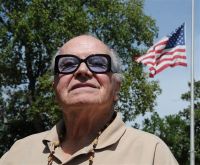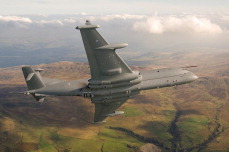WASHINGTON, Nov. 11, 2010 — David Fike got the urge to serve early, but his father insisted that he think about the decision thoroughly and perhaps consider an officer candidate program, rather than running to enlist in the Army Air Corps in 1944.
He joined the V‑12 Navy College Training Program, an ROTC cousin designed to supplement the Navy and Marine Corps with commissioned officers during World War II.
Fike served in that program as an apprentice seaman from 1944 to 1946 – he never attended basic training because the war had ended – then returned home to attend pre-med courses at Dartmouth University.
“After I graduated with [a bachelor of arts] degree as a civilian, I worked as a chemist at the University of Wisconsin,” he said.
He was there when the Korean War started in 1950. Fike was in reserve deferred status until his senior year of law school; it was then that he received his draft notice. “I went up to the Navy who had given me the benefit of three years in college, gratis, and I attempted to return to the Navy,” he said. “Of course, there are rules and restrictions with those who have received their draft notice. As they’re telling me this, sitting there is a Marine Corps recruiter, who beckoned me over.”
Three weeks later, Fike was in charge of a group of Marine recruits on a train from Chicago to San Diego. He attended basic training there and was sent to Quantico, Va., for further training. There, he was selected to attend the Basic School and become a second lieutenant. He also attended fire school and artillery training.
“I finally arrived in Korea when it was petering down to an artilleryman’s war, and I was assigned to the 4th Battalion of the 11th Marines,” he said.
When he left Korea, he took command of a firing battery – he had opted for a year’s extension after the war ended. After conducting a variety of operations with his firing battery, Fike left the Corps as a first lieutenant. The day he left the service, he got a letter informing him that he had made the list for promotion to captain, but he never was officially promoted.
Like many of his fellow former servicemembers, Fike reflected humbly about his time in uniform. He said he shouldn’t take too much credit for any medals or commendations he earned, as he wasn’t doing anything except what was asked of him.
“I’m quite sure on introspection … [that] I wasn’t doing anything other than required,” he said.
Fike said today’s Marine Corps still teaches the same values he learned when he was in uniform, even if the skills they learn are very different. His two sons each served four-year enlistments in the Corps, he noted, so he knows to some degree how much it’s changed, and how much has remained the same.
He said he never expected to see Marines doing entirely land-based operations, nor did he expect to see the way war has evolved, from the clear uniformed-military-versus-uniformed-military wars of the past to the more ambiguous operations going on now.
“The Marine Corps is a good place for young men to go if they want to grow up fast, and hopefully won’t get killed in the process,” he said. “It’s a tough row to hoe, and I do not envy anyone in terms of the type of war they’re fighting.”
(“Veterans’ Reflections” is a collection of stories of men and women who served their country in World War II, the Korean War, the Vietnam War, operations Desert Shield and Desert Storm, and the present-day conflicts. They will be posted throughout November in honor of Veterans Day.)
Source:
U.S. Department of Defense
Office of the Assistant Secretary of Defense (Public Affairs)

 von
von 
